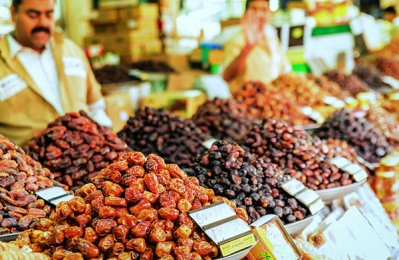Dubai’s total date trade amounted to $221.7 million in 2016, of which exports accounted for the largest share ($85.1 million), followed by imports ($72.1 million) and re-exports ($64.5 million), according to a recent analysis by the Dubai Chamber of Commerce and Industry.
Dubai’s export share of the emirate’s total date trade stood at 38 per cent in 2016. Compared to other emirates, Dubai was the top exporter of dates to other countries in 2015 with 96 per cent market share of the UAE’s date exports.
The UAE’s share of global date exports stood at 8.5 per cent, or $96.3 million in 2015, according to data from Trade Map, making the country the world’s fourth largest exporter of dates.
Southeast Asia and Mena were identified as the top importing regions for UAE dates. However, North America and Europe were also among the largest date importers.
The analysis pointed out that Dubai's date exports recorded a compound annual growth rate (CAGR) of 34.1 per cent between 2011 and 2015. The quantity of dates exported from the emirate in 2016 amounted to 108,300 tonnes, which is slightly below peak levels seen in 2015.
The price of dates exported from Dubai in 2016 stood at $786 per tonne, while the price for re-exports and imports were $405 per tonne and $399 per tonne, respectively. The export prices from Dubai are more expensive due to the high-quality of dates when compared to those that were re-exported and imported.
India accounted for the largest share of Dubai's date re-exports during the same year with 63 per cent, followed by Bangladesh (13 per cent), Pakistan (4 per cent), while dates imported to the emirate mainly came from countries within the Middle East and Africa region.
Top importing countries
Morocco was the largest importer of Dubai dates in 2016 by value with $11.7 million worth of dates and 14 per cent market share, followed by followed by Oman (13 per cent), India (12 per cent), Bangladesh (12 per cent), and Indonesia (10 per cent).
In terms of quantity, Bangladesh was the largest importer of Dubai dates during the same year as its volume of imports reached 17,600 tonnes or 16.3 per cent of total exports, followed by India (15.6 per cent), Morocco (15.3 per cent), and Oman (12.2 per cent).
Export prices are dependent on the quality of dates and trade costs. In 2016, 77 per cent of the dates exported by Dubai fell into the categories of high-quality, fresh and chilled.
In 2015, global date imports reached $1.1 billion, and India was the world's largest buyer of dates during the year, accounting for an import value of $188.7 million and a market share of 17 per cent. Morocco was the largest importer of dates among MENA countries with a market share of 10 per cent.
Although dates are primarily consumed in Muslim countries, European and North American countries are also among the world’s largest date importers. Within Europe, France was the largest importer of dates in 2015 with a market share of 7 per cent, followed by the United Kingdom (5 per cent), Germany (4 per cent), and Italy (3 per cent). In North America, the United States was the largest importer with a market share of 6 per cent, followed by Canada (3 per cent).
Business opportunities
Data from Dubai Customs shows that the volume of Dubai’s date exports to North American and European countries remained low in 2015. However, the analysis found that Dubai has the potential to boost its date exports to those countries which already enjoy good trade relations with the emirate.
When comparing the prices of dates imported to Europe in 2015, the UAE offered the lowest price of $1,211 per tonne. The average price of Tunisian dates exported to Europe was $2,270 per tonne, and Algerian dates were priced at $1,691 per tonne.
The analysis highlighted the need to diversify UAE’s date exports beyond fresh and dried dates to other date-based products such as date syrup, date vinegar, and date paste. In addition, blending dates into chocolate or coffee products has the potential to increase interest and demand among Western countries. – TradeArabia News Service
Dubai’s date trade tops $221 million in 2016

Dubai’s export share of the emirate’s total date<br>trade stood at 38 per cent in 2016.

&uuid=(email))